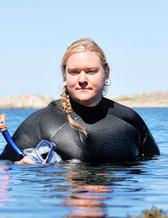The research project "BlueBioBoost - Boosting seaweed farming through better utilization of genetic resources" has received research funding to develop European seaweed farms. The project will develop a genetic breeding programme that will make it easier for seaweed farmers to grow the right seaweed to get the best possible results.
What is the project about?
"We will investigate the genetic variation of seaweed and how this variation can be used in the development of seaweed farms. For example, there are a total of 20 unique species and subspecies of the macroalgae sea lettuce along Sweden's coasts alone, and three of them are invasive. The project is part of the development of a sustainable cultivation of seaweed in order to increase the efficiency of seaweed production in Europe, while protecting our valuable oceans," says Sophie Steinhagen, researcher at the Department of Marine Sciences, University of Gothenburg.

Why is this research important?
"We need to eat more food from the sea for a more sustainable world. The European seaweed industry has considerable potential to contribute to critical societal challenges such as carbon neutrality, access to nutritious and sustainable food, and a sustainable and circular European bioeconomy."
"However a backbone of solid scientific research is needed. The scientific objectives of BlueBioBoost include improving propagation efficiency and genotype selection, better utilizing genetic variation while maintaining local diversity, and actively engaging stakeholders in formulating a plan for the sustainable future of macroalgae breeding in Europe. Asian macroalgae cultivation has demonstrated the benefits of genetic improvement through selective breeding. Therefore, we outline a comprehensive breeding programme involving the monitoring of genetic changes and the implementation of methods to prevent hybridization with natural populations, ensuring the health of marine ecosystems."
What is the goal of the project?
"The project aims to contribute significantly to the European Blue Economy and sustainable seaweed aquaculture. The primary focus is on enhancing the utilization of genetic resources in seaweed cultivation. We are an international team of researchers from Norway, Belgium, Ireland, and Sweden and the project spans various European sea basins, including the Atlantic Sea, the North Sea, and Skagerrak, with anticipated outcomes impacting all relevant coastal areas for macroalgae cultivation in Europe."
"We will also actively involve stakeholders and companies in shaping macroalgae processing in Europe. For example, I will, together with the seaweed company Nordic Seafarm, develop breeding efforts for sea lettuces and sugar kelp."
Text: Annika Wall






